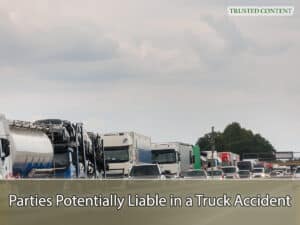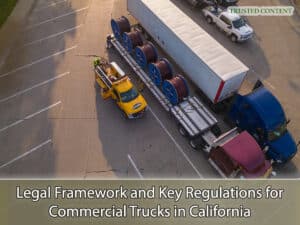The aftermath of a truck accident can be overwhelming and complex, especially when determining liability among the parties involved. In southern California, where the bustling freeways witness a significant share of truck traffic, understanding these dynamics is crucial. Each truck accident case involves multiple facets of law and regulation, making it essential for victims to comprehend who can be held accountable.
Understanding Liability in Truck Accidents
Unlike typical car accidents, truck accidents often involve a web of potential liability that extends beyond the drivers themselves. These accidents can result from a combination of driver error, mechanical failures, improperly loaded cargo, and many other factors, all of which need to be carefully analyzed to determine fault. Establishing liability is the first step in seeking justice and compensation for injuries and damages caused by such incidents.

Parties Potentially Liable in a Truck Accident
Parties Potentially Liable in a Truck Accident
The Truck Driver
Truck drivers are often at the forefront of scrutiny after an accident. Their responsibilities include adhering to road safety laws, ensuring proper vehicle maintenance, and staying vigilant of their driving conditions. Common breaches of duty that can lead to accidents include:
- Driving under the influence of alcohol or drugs
- Fatigue due to non-compliance with hours-of-service regulations
- Distracted driving, such as using a cellphone while driving
- Speeding and reckless driving
Trucking Company Accountability
Trucking companies have a legal obligation to ensure their fleet and drivers comply with safety standards and regulations. These entities can be held liable for:
- Negligent hiring practices
- Failing to provide proper training and supervision
- Not enforcing compliance with federal and state safety regulations
- Ignoring maintenance needs that could prevent vehicle failure
The concept of vicarious liability also applies, where companies are responsible for the actions of their employees performed within the scope of their employment. Additionally, if a trucking company cuts corners on safety to reduce costs, they can be directly negligent.
Truck Manufacturers and Parts Suppliers
Manufacturers of trucks and truck parts have a duty to produce vehicles and components that meet safety standards. When accidents are caused by mechanical failures that trace back to defective design or manufacturing, these entities can be held liable. Common defects include faulty brakes, engine problems, or defective tires. Product liability claims against manufacturers require showing that the defect was present at the time of sale and that it directly caused the accident.
Cargo Loaders and Shippers
The way cargo is loaded can significantly impact truck stability and safety. Improperly secured or overloaded cargo can lead to accidents, and the parties responsible for loading and shipping might be held liable if their negligence contributed to an accident. Key considerations include:
- Ensuring that cargo is evenly distributed and securely fastened
- Adhering to weight limits and other specifications
- Conducting thorough checks before the truck is cleared to depart
Maintenance and Inspection Providers
Regular maintenance and inspection are vital for truck safety. Providers of these services can be held liable if their failure to properly maintain and inspect trucks leads to accidents. This could involve overlooking critical issues during routine checks or failing to recommend necessary repairs that could prevent mechanical failures.
Each of these parties plays a critical role in the ecosystem of truck transportation, and their actions or inactions can significantly impact road safety in southern California. Understanding these relationships and responsibilities is crucial for anyone involved in or affected by a truck accident.

Legal Framework and Key Regulations for Commercial Trucks in California
Legal Framework and Key Regulations for Commercial Trucks in California
Navigating truck accident claims involves understanding the comprehensive federal and state regulations that govern trucking operations. These regulations are designed to enhance road safety and reduce accidents. Key regulatory bodies such as the Federal Motor Carrier Safety Administration (FMCSA) impose stringent requirements on hours of service, driver qualifications, vehicle maintenance, and cargo handling. Compliance with these regulations can often form the basis for establishing liability in truck accident cases, making it essential for legal practitioners and victims to be familiar with these laws.
Key California regulations mandate that motor carriers cannot operate on public highways without a valid motor carrier permit, which is issued after compliance with several safety and operational regulations is verified. This includes undergoing necessary controlled substances and alcohol testing as per federal guidelines. The law also outlines strict requirements for maintaining and presenting records of such tests.
Moreover, these laws ensure that all commercial drivers, including those operating under contract, meet rigorous safety and operational standards before being placed on duty. This comprehensive framework not only enhances road safety but also ensures that all commercial transportation activities are conducted under stringent regulatory oversight, thus safeguarding public interests and maintaining high standards within the trucking industry.
First Steps Following a Truck Accident in California
Immediate actions taken after a truck accident can significantly influence the outcome of legal proceedings and the ability to obtain fair compensation. Victims should consider the following steps:
- Ensure safety by moving to a secure location and checking for injuries.
- Contact emergency services to report the accident and receive medical attention.
- Document the accident scene with photos and videos, capturing vehicle positions, visible damages, and road conditions.
- Collect contact and insurance information from all parties involved, including witnesses.
- Avoid discussing fault or making statements that could be used against you in legal processes.
- Report the accident to your insurance company as per the policy requirements.
- Consult with a qualified personal injury lawyer to discuss your rights and next steps.
Statute of Limitations for Truck Accident Claims in California
California law stipulates a statute of limitations that governs the timeframe within which a truck accident claim must be filed. Generally, injury claims must be initiated within two years from the date of the accident. Failing to adhere to this deadline can result in the permanent forfeiture of the right to seek compensation.
How a California Personal Injury Lawyer Can Assist
Navigating a truck accident claim involves complex legal considerations and procedures that can be daunting for victims. An experienced personal injury lawyer plays a crucial role in:
- Investigating the accident to determine all potential sources of liability.
- Gathering and analyzing evidence that supports the claim, including driver logs, vehicle maintenance records, and cargo documentation.
- Consulting with experts in accident reconstruction, mechanical engineering, and medical fields to strengthen the case.
- Negotiating with insurance companies and liable parties to secure fair settlements.
- Preparing for and representing the client in court, if necessary.
Personal injury lawyers also help victims understand their rights and the full extent of compensation they may be entitled to, which can include medical expenses, lost wages, pain and suffering, and more.
A Guide to the Parties Involved in a California Truck Accident
A Guide to the Parties Involved in a California Truck Accident
Understanding the complexities of truck accidents and the various parties involved requires professional expertise to ensure that victims receive the justice and compensation they deserve. If you or someone you know has been involved in a truck accident in southern California, it’s imperative to act swiftly and consult with legal professionals who are equipped to handle the intricacies of such cases.
Contact Napolin Accident Injury Lawyer today at (866)-NAPOLIN for a free consultation. Our experienced team has a proven track record of navigating complex auto accident claims and securing favorable outcomes for our clients.
We understand the devastating impact these accidents can have on individuals and families, and we are committed to providing compassionate and effective representation. Don’t navigate this challenging time alone; let our extensive litigation experience and dedicated legal expertise work in your favor to secure the compensation and peace of mind you deserve.
- A Guide on Red Light Auto Accidents in California - August 14, 2024
- Self-Representing in a California Personal Injury Claim - August 13, 2024
- Common Sources of Distraction for Drivers in California - August 13, 2024
